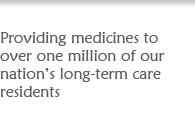|
Long Term Care Guidance |
| |
This document represents guidance to assist Medicare Part D plans in formulating policies for the implementation of CMS requirements regarding pharmacies providing product and services to Long Term Care (LTC) facilities. |
|
http://www.cms.hhs.gov/PrescriptionDrugCovContra/Downloads/LTCGuidance.pdf |
| |
|
|
“Institutionalized” for the Purpose of Applying a $0 Co-payment: Q&A 7907 |
| |
In the first partial month of admission (i.e. when an individual is admitted on any day other than the first of the month, from a community setting to a medical institution for the remainder of the month) the individual is not considered institutionalized for part D purposes. Effective the first day of the following month, if the individual is expected to remain throughout the month, assume the co-pay should be at the institutional level of $0. |
|
http://questions.cms.hhs.gov/cgi-bin/cmshhs.cfg/php/enduser/std_adp.php?p_faqid=7907 |
| |
|
|
Part D Plans Can Reimburse LTC Pharmacies Directly for Improperly Withheld Copays : Q&A 7040 |
| |
“When implementing retroactive subsidy level changes for a full-benefit dual eligible who meets the definition of an institutionalized individual but is incorrectly charged cost sharing under the Part D benefit, plans should not automatically reimburse beneficiaries residing in long-term care facilities.” |
|
http://questions.cms.hhs.gov/cgi-bin/cmshhs.cfg/php/enduser/std_adp.php?p_faqid=7040 |
| |
|
|
Best Available Data: Q&A 7346 |
| |
“Part D plans have flexibility to develop their own procedures for determining whether best available information is sufficient to change or update their systems to reflect appropriate cost sharing levels for dual eligibles.” |
|
http://questions.cms.hhs.gov/cgi-bin/cmshhs.cfg/php/enduser/std_adp.php?p_faqid=7346 |
| |
|
|
Convenient Access Standard |
| |
“Plans must establish a network of LTC pharmacies that provides convenient access to LTC pharmacies for enrollees residing in LTC facilities. Plans may not rely on out-of-network access to meet the convenient access standard.” |
|
http://www.cms.hhs.gov/PrescriptionDrugCovContra/Downloads/LTCCoverLetter11.08.05.pdf |
| |
|
|
LTC Pharmacy Network Contracting, ICF/MR and IMD, September 2006 |
| |
CMS wants to remind all Part D plan sponsors of their continued contractual obligation to have a LTC pharmacy network that provides convenient access for beneficiaries living in LTC facilities in their service area, as provided in 42 CFR 423.120(a)(5). |
| |
Download CMS Memo (PDF) |
| |
|
|
Out of Network |
| |
Part D sponsors must ensure that their enrollees have adequate access to covered Part D drugs dispensed at out-of-network (OON) pharmacies when those enrollees cannot reasonably be expected to obtain covered Part D drugs at a network pharmacy, and when such access is not routine. See page 42 of the DRAFT Chapter 5 PDB Manual. |
|
http://www.cms.hhs.gov/PrescriptionDrugCovContra/Downloads/PartDManual_Chapter5.pdf |
| |
|
|
LTC Recommendations on Parts B & D |
| |
In order to simplify access to the Part D drug benefit in the long term care (LTC) setting, we are recommending that certain steps be taken by providers to clearly differentiate those drugs which may qualify as Part B drugs and those which may qualify as Part D drugs. |
|
http://www.cms.hhs.gov/PrescriptionDrugCovContra/downloads/LTCAssocLetter.pdf |
| |
|
|
Part D Drug Ownership / Donating Unused Prescription Drugs: Q&A 7828 |
| |
“If a beneficiary, typically residing in a nursing home, finds that they have an unused prescription medication, paid for by the Medicare prescription drug benefit, they can donate this medication, to the extent allowable under Federal and State law and regulation, to State agencies and charitable organizations.” |
|
http://questions.cms.hhs.gov/cgi-bin/cmshhs.cfg/php/enduser/std_adp.php?p_faqid=7828 |
| |
|
|
Safety Syringes: Q&A 7826 |
| |
“we are correcting our previous Q&A to define insulin syringes equipped with a safe needle device, in their entirety (syringe and device) as Part D drugs and subsequently they should be managed like any other Part D drug the plan places on their formulary.” |
|
http://questions.cms.hhs.gov/cgi-bin/cmshhs.cfg/php/enduser/std_adp.php?p_faqid=7826 |
| |
|
|
Clarification: Are ICFs/MR and IMDs Considered LTC? Q&A 6111 |
| |
Does CMS consider ICFs/MR and IMDs as LTC facilities? Additionally, state contacts for each are included in this FAQ. |
|
http://questions.cms.hhs.gov/cgi-bin/cmshhs.cfg/php/enduser/std_adp.php?p_faqid=6111 |
| |
|
|
Refill Too Soon: Q&A 6986 |
| |
“…When an enrollee is admitted to or discharged from a LTC facility, he or she will not have access to the remainder of the previously dispensed prescription (through no fault of his or her own) and, therefore, the Part D plan must allow the enrollee to access a refill upon admission or discharge.” |
|
http://questions.cms.hhs.gov/cgi-bin/cmshhs.cfg/php/enduser/std_adp.php?p_faqid=6986 |
| |
|
|
Emergency First Fill |
| |
“We believe that Part D plans must cover an emergency supply of non-formulary Part D drugs for long term care residents as part of their transition process.” |
|
http://www.cms.hhs.gov/PrescriptionDrugCovContra/Downloads/EmerTLCFill.pdf |
| |
|
|
Best Available Data Clarification |
| |
Web Link Coming Soon! |
| |
|
|
Post Consumption Billing by LTCPs Q&A 6486 |
| |
Does the practice of “post-consumption” billing in long-term-care pharmacies have to be accommodated by Part D plans under the Medicare Prescription Drug Benefit? |
|
http://questions.cms.hhs.gov/cgi-bin/cmshhs.cfg/php/enduser/std_adp.php?p_faqid=6486 |
| |
|


